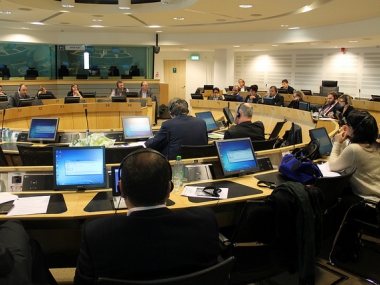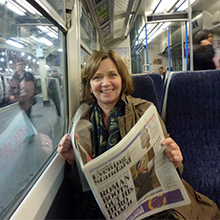Enhancing local capacities for governance
Edited on
09 May 2017Results of the URBACT Elected Representatives Pilot Training
Participants in URBACT networks learn about participatory and integrated planning by developing a Local Action Plan in their city, and sharing that development process with peers from other cities in their networks, as well as attending capacity building events, such as seminars and Summer Universities. The mid-term evaluation of the URBACT II programme, completed in spring 2011, highlighted the importance of the participation of local elected representatives in driving the successful development and implementation of URBACT Local Support Groups (ULSG) and Local Action Plans (LAP). But involving local elected representatives in that process, and sustaining their commitment to the Local Plan is not always so easy.

Consequently, and at the request of the European Commission DG for Regional and Urban Policy, URBACT piloted a specific training scheme in 2013 for elected representatives in URBACT partner cities. The aim was to give elected representatives a better understanding of European urban policy, an insight into what integrated and sustainable development involves, and the practical tools needed for project management. The results were intended to inform their decision-making and also improve the quality of URBACT Local Action Plans and help to develop Local Support Groups. The targeted participants were mayors and deputy mayors, elected representatives with a portfolio responsibility linked to sustainable urban development. The training took place in Brussels with three or two day seminars over the course of nine months. 30 elected representatives from cities involved in ongoing URBACT networks were selected to take part. More information about the programme as it evolved can be seen here:
http://urbact.eu/en/news-and-events/urbact-events/training-for-elected-representatives/
The evaluation of the pilot is now available and concludes that the scheme was successful in creating a better understating of the integrated approach to urban development. The level of satisfaction with regard to the training scheme’s content, organisation and format was very high. As with many URBACT activities participants judged the most rewarding experience to be the peer-review, and the opportunity to share and interact with other elected officials around Europe. In many cases cities report that the training has led to improved working relationships between elected representatives and USLG coordinators. There is a sense that leadership of the URBACT project has became more of a shared responsibility between elected officials and administrative officials.
The evaluation gives evidence of tangible improvements in local elected representatives’ approach to the work of their ULSG, as a result of the training. For example, in terms of ULSG composition and representation of local stakeholders, one Italian participant stated that participation in the training scheme led him to expand the number of partners involved in the USLG.
“The local group was composed of ten members and after the training scheme there were about fifty members… I personally talked to the coordinator of the group and we decided to involve more people after this experience.”
In another case, participation in the pilot scheme led the elected representative to review the scope and ambitions of the city’s USLG. The project went from focussing strictly on the renewal of infrastructure, to developing a sector-wide approach to the delivery of health services.
“When we started the URBACT project, the mayor and the city council only had in mind to re-open a hospital. After working with URBACT and attending the training seminar, the approach was much wider and much more oriented towards addressing general health issues at the city level.”
USLG representatives interviewed by the evaluators clearly indicated that the training scheme played an important role in bringing elected representatives up to speed in terms of the concepts and methods promoted by URBACT. One USLG representative, for example, indicated that the participation of the local elected representative in the training scheme made it much easier to explain the work and progress achieved by the USLG, while considerably strengthening their day-to-day working relationship.
“Participation in the scheme certainly allowed to strengthen our officer-elected member relationship… It just makes it much easier when we talk about the concepts around URBACT.” Participants became more confident in using the tools presented during the seminars, in the framework of their USLG activities.
“The seminars allowed me to better organise our USLG methodology. The work conducted during the group activities led us to use some new tools, such as the problem tree, at home.”
Recommendations for future training include more real-life examples of integrated planning in practice and more tailored assistance and coaching in between seminars.
It seems that the URBACT scheme, which is unique in Europe, can help better connect local politicians to the initiatives being developed within the URBACT networks, to give the plans a better chance of approval, higher visibility and, ultimately, success. Looking to the future, the URBACT III programme will build on this experience, to bring elected representatives closer to local planning within URBACT networks, to encourage more participation of elected representatives in all programme activities, as well as provide dedicated training and support.
“I hope this programme will help me to be a better politician in my city”, Beata Stepaniuk, Councillor in Lublin, Poland, EUniversities project.
 Submitted by Sally Kneeshaw on
Submitted by Sally Kneeshaw on
